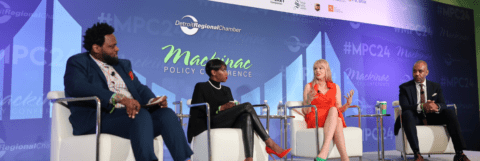By seeking to address Michigan’s population crisis through an inclusive vision for communities, it has welcomed attention to the racial disparities in traditional support and resources that are performative and lack longevity. Charity Dean, President and Chief Executive Officer of the Michigan Black Business Alliance, addressed this head-on, highlighting how it has recognized that small businesses deserve more opportunities rather than just acknowledging the dissonance.
“We can support small businesses in the ways that we support other industries,” she said calling for actionable support for small businesses versus just acknowledging disparities. “We call those out within [government] to do something about it and we don’t just become experts on problems – so much so that we talk about the problem in lieu of a solution.”
Perry agreed, saying, “that as far as [bettering the] conditions for Black-owned small businesses go, it creates better conditions for overall quality of life for the entire community … we need to break this mindset that investing in one group is to the detriment of someone else.”
“Understand that if you really want to increase population [and] GDP, all these things you have to invest in the people who need it most,” he said. Doing so builds a solid foundation for the communities that Michiganders desire and will undoubtedly become pivotal to attracting new residents.





